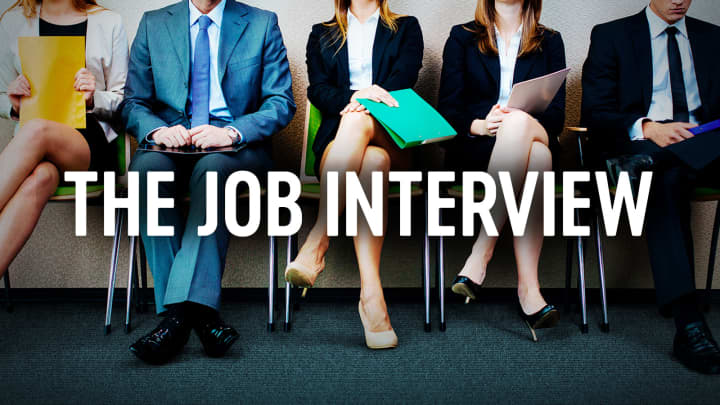17 Things You Should Never Say In A Job Interview
Job Interviews Are Stressful. With So Much Pressure To Say The Right Things, It’s Easy To Make Mistakes.
There’s always a chance you’ll say something that could cost you a job you love, Even if you have all the necessary conditions. But dear friend, take it easy!

During a job interview, everything you say matters. You must ensure you focus on presenting the best version of yourself to employers, making a great impression, and making as few mistakes as possible.
1. Sorry I’m late!
Being late is a guaranteed way to make a wrong impression before you even meet the interviewer, and there’s little chance you’ll be able to make up for it. First impressions are an essential determining factor in whether the company hires a person. So, make their first impression of you a positive one.
When you show up late for an interview, you show poor time management skills and don’t respect the company or your position. Be sure to arrive on time; even better to be there 10 minutes earlier.
2. Can you wait a moment? I have to answer this.
Texting or returning calls during an interview tells employers that you don’t care about the job opportunity and don’t mind wasting their time. It is not appropriate behavior when you are trying to get a job.
Put your phone down and turn it off completely. Your priority is to give your full attention to the interviewer. So, make sure your phone is not disturbed. We know it’s hard to be separated from your beloved smartphone, but you’ll soon be reunited.
3. I am a perfectionist.
A classic interview mistake is to answer the most critical weakness question with a strength. Saying you’re a perfectionist or a workaholic won’t impress anyone. You look just like everyone else who didn’t get a job.
Everyone has a weakness. The point is to show the interviewer that you are taking the necessary steps to improve your shortcomings, Not just saying that you are a perfect person.
4. So, what exactly are you guys doing here?
If you do not research the company before the interview, it is better not to go to it. It would help if you never went into an interview without having information about the company or the desired job position.
Also, what do you know about our company if they ask you for a routine interview? You will have to prepare an answer on the spot, which usually will not be the correct answer.
It would help if you showed employers that you have researched their company and learned as much as possible. It shows them you are motivated and excited to work with the company. Check out the company’s website and read the “About Us” section. You will most likely find what you need.
5. I know I don’t have much experience, and I’m probably not the best person
Do not underestimate your strengths! Even if you don’t have all the necessary qualifications, it doesn’t mean that you are not the best person for the job. There is no room for modesty in a job interview. On the contrary, it’s time to show employers why you’re the best fit.
A little passion can get you further than a list of credentials. Instead of drawing people’s attention to your shortcomings, focus on your skills and experiences and how you can use them to succeed in this job. Show the interviewer that you are excited about the job opportunity.
6. How many days is my holiday?
Yes! Asking about vacation gives employers the impression that you don’t want to be there. You haven’t even been offered a job, and you’re questioning when you can leave.
During the interview, employers want to know what you can do to help the company succeed, Not how they can fulfill your wish list. If you get a job offer, the conversation also discusses vacation time. But if you mention vacation during the interview, you’ll probably get a disqualification letter.
The same goes for questions about salary, flexible working hours, or other benefits and privileges.
7. I am persistent and think creatively.
It’s boring! Skip these boring words. Maybe you will continue to say: I am an ordinary and boring person with no imagination and cannot think for myself. What have you achieved by working hard?
Talk about your accomplishments if you want to impress employers with your persistence and hard work. Use words like “acquired, developed, created, or organized.” Unsubstantiated and generic self-definitions essentially make an empty promise to employers.
In any explanation you give, please do not talk about teamwork.
8. I do not know.
If you answer “I don’t know” to an interview question, you’re giving the position away to someone who can give any other answer.
Before the day of the interview, practice and prepare by answering the most common questions. Even if you come across a question for which you did not have an answer during the interview, use practice answers. Any response is better than “I don’t know.”
9. It is mentioned in the resume.
This rude response to the question is surprisingly common. You might think you’re doing the interviewer a favor by referring him to your resume so he can see the information he’s asked for in a structured way.
But the interviewers have already reviewed your resume, and now you are in the interview stage. Here, your communication skills are evaluated as much as your educational qualifications. At this point, the hiring manager or HR person is more interested in how you talk about your professional experiences.
A resume can be a great starting point, but you must bring this lifeless sheet to life during the conversation.
10. My previous boss was not a good person.
You might think repeating this sentence is an acceptable answer to questions like “Why are you looking for a new job?” or “Why did you leave your last job?” Is. These questions don’t necessarily try to trap you into negativity, but they seem to invite a negative answer.
Always avoid this temptation. Talking negatively about a former boss, coworker, or company is a red line for most hiring managers and HR executives. They’re only hearing your explanation, and for all they know, it’s just as likely that you’re the problem.
When you are asked about a negative situation, turn the conversation positive. For example, if you’re asked what you didn’t like about your previous job, focus more on the positive changes you wanted and the lessons you learned from the experience.
11. I have the complete answer to this question.
OK! So, you’re not saying the same thing (hopefully). We’re dealing with memorizing the answers and speaking them like reading from a book. While preparing for many common interview questions is a good idea, there should always be room for improvisation.
Interviewers want to hire the right people, But on the other hand, they want to add a person with character and credibility to their list, not a fully-tuned robot.
We recommend you address several topics that cover all the main categories of interview questions (accomplishments, differences, goals, etc.) and then prepare a set of essential points for each.
In this way, you have the main framework of the writing that contains the most critical points in the answers guarantees; Without having to memorize the answers.
12. Oh, damn! Really?
Profanity in a job interview is a firm no-no. It makes it seem like you’ve taken the whole process too casually. Also, some people consider profanity to be disrespectful. Even if the interviewers are not very polite, they pay attention to profanity and consider it unprofessional.
You might meet the friendliest interviewer in the world. A man who uses so many dirty words that a pirate would be ashamed. Regardless of the interview’s tone, keep your writing appropriate to the environment. It does not give you the license to be abusive at all.
13. And on my sixth trip around Asia
Talking a little about non-work-related topics in a job interview is perfectly fine. Some interviewers enjoy warming up the conversation or ending the discussion this way.
But when you start talking about your personal life and dreams that have nothing to do with the job, you will lose the attention of hiring and HR managers.
Slowly share information about hobbies and non-work-related experiences. Gauge the interviewer’s interest and then proceed.

14. This gives me
At first glance, it may seem OK to say you want the job because it’s a good experience, but to an interviewer, it’s an evil and selfish reason to have a job.
While you can talk about being attracted to professional development opportunities and working alongside such talented people, you should avoid mentioning that the company pays you while you are being trained.
Always consider how your work fits into the employer’s overall goals. You may think of this job as your ladder to reach a higher career, So, in this case, you don’t have to be sure to mention your main goal. Instead, focus on the value you bring to the company. Adjust your responses and motivations accordingly.
15. Umm, uh, mmm
It is reasonable for the hiring manager to assume that you will have difficulty communicating clearly with clients or team members. This communication is essential for most businesses. In this way, filler words make you look unprofessional and lack confidence.
We recommend doing a mock interview and recording your conversation. Maybe you understand your most critical verbal tics well, But listening to your voice can help you identify incorrect speech patterns.
Of course, these kinds of habits do not disappear overnight. Just be careful with them and minimize the number of times you use them during the interview.
16. No, I have no questions.
When the interview ends, you’re asked, “So, do you have any questions for me?” Big mistake! Huge! You should always have a list of tough questions to ask the interviewer and never, under any circumstances, say “No! There is no question!”
By not asking any questions, you’re telling employers that you don’t care enough about the company or the position to learn anything else about them. Also, having questions does your interview more like a conversation than an interrogation.
17. When do you think we will conclude?
Your interview should be your priority, So do the same. Asking when the interview ends gives the impression that you should be in a more critical place sooner. If the employer thinks there is something more meaningful and you need to get there more shortly, expect the interview to end quickly, and your chances of getting that job are lower.
last word
Your biggest goal during a job interview is to show the employer why you are the best person for the job. Remember to focus on “what you can offer them, how you can help their company, and how motivated you are to work with their team.”
Saying anything that makes employers think otherwise is a great way to remove yourself from the hiring process. Let’s not let this happen. Be confident, do your research and make the interview your top priority. Make sure you give the correct answers and get the desired job!
If you have any experience with things you said in interviews that you shouldn’t have or with job interviews in general, please share them in the comments section.

